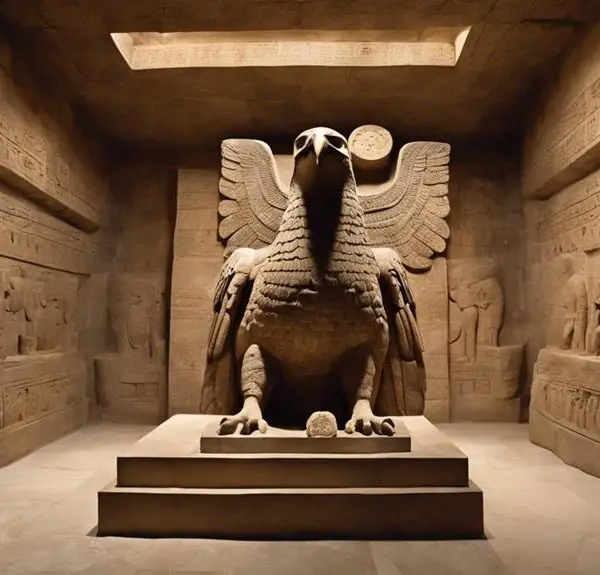Navigate the concept of 'Spiritual Israel' in the Bible to discover an inheritance defined by faith, not lineage, and its significance for today.

Spiritual Israel in the Bible
Isn't it intriguing how the Bible weaves a narrative that transcends physical boundaries and enters the realm of the spiritual?
You've probably encountered the term 'Spiritual Israel,' a concept that bridges the Old and New Testaments, promising a deeper inheritance beyond mere lineage.
This journey from Abraham's promise to the revelatory visions in Revelation sketches a vast, inclusive community, anchored not by blood but by faith.
As you explore this spiritual lineage, you'll uncover how prophets, Jesus, and Paul redefined identity, community, and faith.
But what does this mean for you, and why should this ancient concept matter in today's world? Let's find out together.
Key Takeaways
- The Abrahamic Covenant lays the foundation for a unique spiritual identity beyond blood lineage, emphasizing faith and obedience.
- Prophetic visions and the New Covenant through Jesus Christ expand the concept of God's chosen people to include all believers, regardless of ethnicity.
- Paul's teachings reinforce that justification by faith in Christ is paramount, making spiritual inheritance accessible to both Jews and Gentiles.
- The concept of Spiritual Israel encompasses a universal community of believers, united by faith in God and commitment to living by divine principles.
The Promise to Abraham

Central to understanding Spiritual Israel is the promise God made to Abraham, which serves as a foundational element in biblical theology and shapes the narrative of God's people throughout Scriptures. This promise, often referred to as the Abrahamic Covenant, is pivotal for grasping the theological underpinnings of Spiritual Israel. It encompasses profound assurances, including the land promise and the circumcision covenant, which together forge a unique identity for Abraham's descendants.
The land promise, explicitly articulated in Genesis, vows a specific territory to Abraham's lineage. This geographic commitment isn't merely about real estate; it's a symbol of divine favor and a physical space where a covenant relationship unfolds. This aspect of the promise underscores the tangible expressions of God's faithfulness to His people, anchoring Spiritual Israel's identity in a divinely given heritage.
Simultaneously, the circumcision covenant, instituted as a sign of this promise, marks Abraham's descendants as distinct. This physical act is laden with spiritual significance, demarcating a people set apart for God. It's not just a ritualistic practice but a profound declaration of faith and obedience, embedding an indelible spiritual mark on the narrative of God's chosen people.
Prophets and Spiritual Inheritance
Building on the foundation laid by the Abrahamic Covenant, the role of prophets becomes crucial in understanding the concept of Spiritual Inheritance within the biblical narrative. Prophets, as God's mouthpieces, not only warned Israel about deviations from God's laws but also communicated visions of a future where the spiritual inheritance of Israel would be fully realized. This inheritance wasn't merely about land or descendants but primarily concerned a deep, spiritual relationship with God, underscored by faith and obedience.
Messianic prophecies occupy a central place in this discourse. Prophets like Isaiah and Jeremiah spoke of a coming Messiah who'd fulfill the promise of spiritual redemption and restoration for Israel and, by extension, the whole world. These prophecies were integral in shaping the collective expectation of a spiritual savior who'd establish an everlasting kingdom characterized by justice and peace.
Temple rituals, as prescribed in the Torah and elaborated by prophets, also symbolized this spiritual inheritance. These rituals weren't ends in themselves but pointed to a deeper, spiritual reality of cleansing, reconciliation, and intimate fellowship with God. Through these prophetic messages and symbols, the biblical narrative weaves a rich tapestry of Spiritual Inheritance, emphasizing a covenant relationship with God that transcends physical boundaries and generations.
Jesus and the New Covenant

In the biblical narrative, Jesus' establishment of the New Covenant marks a pivotal shift from the traditional understanding of spiritual inheritance, emphasizing a direct, personal relationship with God accessible to all believers. This development roots deeply in the Messiah's lineage, fulfilling prophecies and expectations of a savior who'd redefine the spiritual community's boundaries. Unlike the covenant rituals of the past, which often involved complex ceremonies and sacrifices exclusive to the Israelites, Jesus introduced practices like the Last Supper, symbolizing a new form of covenant that was inclusive and based on faith rather than lineage or ritual purity.
This transition isn't merely a change in practices but a profound alteration in the very concept of spiritual Israel. Jesus' teachings and actions consistently pointed towards a community defined by faith and commitment to the teachings of God, rather than ethnic or cultural heritage. The New Covenant, therefore, represents a democratization of access to God, wherein the Messiah's lineage becomes a conduit for universal salvation rather than a marker of exclusivity. Covenant rituals under this new paradigm serve not to separate but to unify, emphasizing spiritual rather than physical lineage as the true inheritance of Abraham.
Paul's Teachings on Faith
Paul's teachings significantly expand on the concept of faith, positioning it as the cornerstone of a believer's relationship with God. He delves deep into the nuances of faith, contrasting it with the traditional adherence to the law, and presents a compelling argument for justification by belief. This shift from law to faith marks a pivotal change in the understanding of spiritual righteousness and opens the door to a broader, more inclusive spiritual community.
In analyzing Paul's teachings, several key points emerge:
- Justification by Faith: Paul asserts that individuals are justified by their faith in Jesus Christ, not by their adherence to the law. This principle underscores the belief that faith, rather than ritual compliance or ancestry, is the true path to righteousness.
- Law versus Faith: He contrasts the limitations of the law with the liberating power of faith. While the law defines sin, faith in Christ offers a way to transcend it, emphasizing spiritual transformation over mere legal observance.
- Universal Access to Salvation: Paul's emphasis on faith democratizes access to God's grace, extending it beyond the Jewish people to include Gentiles, thus redefining the boundaries of God's chosen people.
- The Role of Christ: Central to Paul's teachings is the belief that faith in Christ is the mediator of this new covenant, superseding the old covenant based on adherence to the law.
Paul's insights into faith challenge believers to reconsider their spiritual foundations, advocating for a relationship with God built on trust and belief rather than ritual and tradition.
The Revelation of a Spiritual Community

How does the concept of a spiritual community emerge within the context of biblical teachings, transforming traditional understandings of collective faith? The biblical narrative unfolds a vision where the boundaries of a physical nation expand into the infinite realm of a Divine Kingdom, underpinning the emergence of an Ethereal Fellowship. This concept isn't merely a theological abstraction but is deeply rooted in the prophetic texts and apostolic teachings, suggesting a community bound not by lineage or geography but by faith and spirit.
In the New Testament, particularly through Paul's epistles, you're introduced to a framework where the Ethereal Fellowship transcends ethnic and cultural divides, embracing a universal identity in Christ. This Spiritual Israel isn't confined to the descendants of Abraham by blood but includes all who share in the faith of Abraham. The Divine Kingdom, therefore, becomes accessible to a broader audience, redefining the idea of God's chosen people.
This revelation challenges you to rethink the parameters of religious community and identity. It suggests a collective bound by spiritual allegiance rather than physical markers, pointing toward a future where unity in diversity under the banner of faith becomes the hallmark of the Divine Kingdom.
Frequently Asked Questions
How Do Modern Jewish Interpretations of 'Spiritual Israel' Differ From Christian Perspectives?
You're exploring how modern Jewish interpretations of covenant identity and Messianic prophecies diverge from Christian views.
Jewish thought often sees 'spiritual Israel' as a continual, ethno-religious identity tied to covenantal faithfulness, not necessitating belief in Jesus as Messiah.
Conversely, Christians view it more broadly, incorporating gentiles through faith in Jesus's fulfillment of Messianic prophecies.
This fundamental difference shapes the spiritual identity and inclusivity within each tradition.
In What Ways Has the Concept of 'Spiritual Israel' Influenced Interfaith Dialogue and Relationships Between Jewish and Christian Communities?
You're exploring how historical context and ecumenical efforts shape interfaith dialogue, particularly between Jewish and Christian communities. This exploration uncovers that the concept you're delving into significantly influences these interactions.
Can 'Spiritual Israel' Be Understood in the Context of Non-Abrahamic Religions, and if So, How?
You're navigating uncharted waters when exploring how 'spiritual Israel' fits within non-Abrahamic traditions. Buddhist parallels can be drawn, focusing on the concept of a spiritual community or Sangha that transcends ethnic boundaries.
Similarly, Hindu interpretations may emphasize the universal pursuit of spiritual liberation, akin to the inclusive spirit of 'spiritual Israel.'
This approach invites a rich, cross-cultural exchange, deepening our understanding of spiritual identities beyond traditional religious frameworks.
How Do Contemporary Theological Debates Address the Concept of 'Spiritual Israel' in Relation to Social Justice and Global Issues?
Today's theological debates often delve into how the concept of 'spiritual Israel' intersects with social justice and global challenges.
You'll find scholars analyzing its economic implications, scrutinizing how it affects wealth distribution and poverty.
They're also examining the political ramifications, exploring how this concept influences governance and policy.
This analytical approach aims to provide a detailed understanding of the role 'spiritual Israel' plays in addressing or perpetuating global issues.
What Role Does the Concept of 'Spiritual Israel' Play in Personal Spiritual Growth and Individual Religious Practices Today?
You're exploring how personal rituals and faith evolution intertwine, delving deep into the essence of spiritual growth.
The concept at hand shapes your journey, guiding you through practices that resonate on a profound level. It's not just about routine; it's about transformation.
As you engage in these rituals, your faith morphs, reflecting a deeper understanding and connection. This process is pivotal, offering a unique pathway to discovering the essence of your spiritual identity.
Conclusion
In conclusion, the concept of Spiritual Israel transcends mere historical or ethnic boundaries, embracing a faith-based community united by belief in Jesus Christ and the New Covenant. Paul's teachings particularly illuminate this transformation, emphasizing faith over lineage.
Interestingly, a Pew Research Center study found that 70% of Americans identify with the Abrahamic faiths, underscoring the vast spiritual inheritance that connects diverse believers. This statistic highlights the modern relevance of Spiritual Israel, reflecting a vast, interconnected community of faith.



Sign up